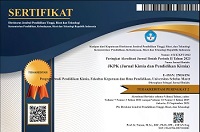Development of Computerized Testlet to Measure Science Process Skill on Stoichiometry
Abstract
This research aims to develop a computerized testlet assessment to measure science process skills on stoichiometry material in terms of validity, reliability, difficulty level, distinguishing features and deception indexes that meet the criteria as good assessment instruments, and can display individual profiles of science process skills students. The subject of the research trial was a grade X student of Senior High School in Boyolali. Validity test is done by content validity, criteria, and expert validation. Reliability test is done by finding the price of the reliability coefficient r. Characteristics test is done by determining the level of difficulty, distinguishing features and deception index. The profile of science process skills is determined by measuring students' mastery of the science process. The results of the research and development was declared feasible and met the criteria as a good question with a validity of questions more than 0.79 (valid), has a test reliability on the main field trials of 0.643 and 0.610 on the trial the implementation of the field is relatively high, has a distinguishing power with a percentage of 10% bad, 66.7% is sufficient, and 23.3% is good, has a difficulty level with a percentage of 20% difficult, 53.3% moderate and 26.7% easy.
Keywords
Full Text:
PDFReferences
S. Maryam. “Peer group dan aktivitas harian (belajar) pengaruhnya terhadap prestasi belajar remaja studi kasus pada SMU bina bangsa sejahtera plus di kota Bogor tahun 2002,” Jurnal pendidikan dan kebudayaan. vol.13, no. 58, pp. 114-131, 2006.
I W. Suastra, “Mengembangkan Ke-mampuan Berpikir Kreatif Melalui Pembelajaran Sains,” Jurnal IKA, vol. 4, no. 2, pp. 23-34, 2006.
I. W. Suastra, Belajar dan Pembelajaran Sains. Buku Ajar. Universitas Pendidi-kan Ganesha Singaraja, 2007.
G. U. Jack, “The Influence of Identified Student and School Variables on Student Science Process Skill Acquisi-tion,” Journal of Education and Practice. vol. 4, no. 5, pp. 16-22, 2013.
E. Igboegwu, “Effects of CoOperative Learning Strategy and Demonstration Method on Acquisition of Science Process Skills by Chemistry Students of Different Levels of Scientific Literacy” Journal of research and Development. vol. 3, no. 1, pp. 204-212. 2011.
L. L Chaguna & D. M.Yango, “Science Process Skills Proficiency of The Grade VI Pupils in The Elementary Diocesan Schools of Baguio and Benguet,” Research Journal. vol. 16, no. 4, pp. 22-32, 2008.
Sukarno, A. Permanasari, & I. Hamidah, “The Profile of Science Process Skill (SPS) Student at Secondary High School (Case Study in Jambi),” International Journal of Scientific Enginering and Research. vol. 1, no. 1, pp. 79-83, 2013.
Arifin. Evaluasi Pembelajaran. Bandung: Rosda, 2009.
W. Harlen, “Inquiry-Based Learning in Science and Mathematics,” Review of Science Mathematics & ICT Education, vol. 7, no. 2, pp. 9–33, 2013.
Organisation for Economic Cooperation and Development (OECD). PISA 2009 Assessment Framework. Key Com-petencies in Reading, Mathematics and Science. Paris: OECD, 2009.
Organisation for Economic Cooperation and Development (OECD). PISA 2015 Assessment Framework. Key Com-petencies in Reading, Mathematics and Science. Paris: OECD, 2015.
Komisi Nasional lndonesia untuk UNESCO. Pendidikan untuk Pem-bangunan Berkelanjutan (Education for Sustainable Development/ESD) di Indonesia. Jakarta: Kemdikbud, 2014.
H.-Y. Huang, W.-C. Wang & P.-H. Chen, “An item response model with hierarchical latent traits,” Paper presented at the annual meeting of the American Educational Research Association, Denver, CO. 2012.
D. D. L. Torres, “Higher-order latent trait models for cognitive diagnosis,” Journal of Psychometrika. Vol. 69, ppp. 333–353, 2004.
Y. Sheng & C Wikle, “Bayesian Multidimentional IRT Models With A Hierarchical Structure,” Journal of Psychology Measurement. vol. 68, no. 3, pp. 413-430, 2008.
D. L. Torre, Bayesian Psychometric Modelling. Information Age Publishing, Inc. USA. 2009.
D. Mars & E. Christine, “Confirming Testlet Effect,” Journal of Applied Psychological Measurement. March, 27. 2012.
H. Aktamis & N. Yenice, “Determination Of The Science Process Skills And Critical Thinking Skill Levels,” Procedia-Journal of Social and Behavioral Sciences, vol. 2, no. 2, pp. 3282-3288, 2010.
E. H. M. Shahali & L. Halim, “Development and Validation of a Test of Integrated Science Process Skills,” Journal of Procedia-Social and Behavioral Sciences, vol. 9, no. 9, pp. 142-146, 2010.
A. S. Shidiq & S. Yamtinah, “Gender Differences In Students’ Attitudes Toward Science: An Analysis Of Students’ Science Process Skill Using Testlet Instrument,” AIP Conference Proceedings 1868, 030003. 2017.
W. R. Borg, & M. D. Gall, Educational Research: An Introduction. New York: Longman. 1989.
D. Mardapi. Pengukuran Penilaian & Evaluasi Pendidikan. Yogyakarta: Nuha Medika. 2012.
Sudijono. Pengantar Evaluasi Pen-didikan. Jakarta: PT Raja Grafindo Persada. 2011.
S. Hadi. Pengembangan Computerized Adaptive Test Berbasis Web. Yogyakarta: Aswaja Pressindo. 2013.
M. Jamil, R. H. Tariq, & R. H. Shami, “Computer-Based Vs Paper-Based Examinations: Perceptions of University Teachers,” The Turkish Online Journal of Educational Technology, vol.11, no. 4, pp. 371-381, 2012.
D. Ratnasari, Sukarmin & Suparmi, “Analisis Implementasi Instrumen Two- Tier Multiple Choice untuk Mengukur Keterampilan Proses Sains,” Jurnal Pendidikan dan Kebudayaan, vol. 2, no. 2, pp. 166-179,2017.
R. Pakpahan. Computer-Based National Exam Model: Its Benefits And Barriers. Jakarta: Pusat Penilaian Pendidikan, Balitbang, Kemdikbud. 2016.
Refbacks
- There are currently no refbacks.








